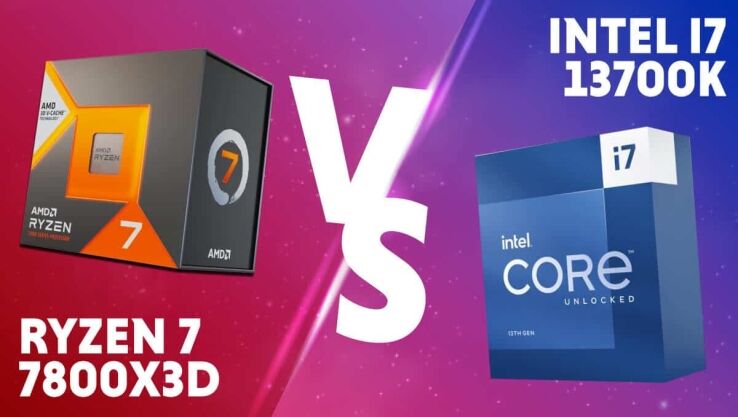Ryzen 7 7800X3D vs i7-13700K
Ryzen 7 7800X3D vs i7-13700K, which is better?

WePC is reader-supported. When you buy through links on our site, we may earn an affiliate commission. Prices subject to change. Learn more
The Ryzen 7 7800X3D is AMD’s entry-level Ryzen 7000X3D option. While the other two 7000X3D processors have been released today, February 28th, the 7800X3D will be released on April 6th. In this article, we’re comparing the future processor with the very popular new Core i7. This is Ryzen 7 7800X3D vs. i7-13700K.
Now read: Is Ryzen 7000X3D worth it
Ryzen 7 7800X3D vs i7-13700K: compared
There are a few noteworthy differences between the 7800X3D and i7-13700K specs. We can see that the 13700K has an advantage in core count, thread count, and clock speeds.
The only advantage the 7800X3D spec sheet shows is the 96MB of L3 cache, which is roughly 4 times that of the 13700K.
Gaming performance
Since the 7800X3D hasn’t been released yet, we don’t have statistics to go off of. However, by making a few minor tweaks to the now-released 7950X3D or 7900X3D (i.e., disabling the second CCD and setting the max clock for the first CCD to 5GHz), we should theoretically be able to simulate its performance.
Based on simulated tests and what we already know about the processor, the 7800X3D will likely deliver gaming performance that’s almost equivalent to the flagship Ryzen 9 X3D processors.
In fact, it’s theorized that the primary reason AMD delayed the release of the 7800X3D to April is that it would cannibalize the sales of the Ryzen 9X3D processors by offering nearly equivalent gaming performance at a much lower price point.
The 7800X3D’s V-cache enhancement will make it a much better gaming processor than the 13700K. The 13700K is a very capable gaming processor in its own right, and it’s able to offer more single-thread performance than the 7800X3D due to higher clock speeds.
Despite having lower single-thread performance, the 7800X3D will deliver more frames. That’s simply how effective the extra cache size is.
How much of a performance gap can we expect in gaming? That remains to be seen, and we can only find out once the 7800X3D is released. But based on what we’ve seen already, it’s clear that the 7800X3D will outperform the 13700K in gaming by a non-negligible margin.
Workstation Productivity
Workstation productivity isn’t too different from gaming performance only it uses the flip side of the coin, the CPU multi-core functionality.
For workstation productivity, the 13700K is the better processor. It has 16 cores and 24 threads compared to the R7 7800X3D’s 8 cores and 16 threads. And not only that, but each of its cores is also running at a higher clock speed than the 7800X3D’s cores.
The 7800X3D does have the extra V-cache, but it doesn’t benefit workstation processing times noticeably, so it just boils down to the other primary specs (core count, clock speed).
Ryzen 7 7800X3D vs i7-13700K: CPU specs
Before anything else, let’s take a refresher on the official specs for both processors.
AMD Ryzen 7 7800X3D
AMD Ryzen 7 7800X3D
Cores:
8
Thread:
16
Boost speed:
5.0GHz
Cache:
96MB
TDP:
120W
- Core count: 8 (Multithreading enabled)
- Threads: 16
- Boost clock: 5GHz
- L2 cache: 8MB
- L3 cache: 96 MB
- TDP: 120 watts
- iGPU: Radeon Graphics
- Socket: AM5
The R7 7800X3D is an 8-core, 16-thread processor with specs similar to the R7 7700X. Of course, there’s the V-cache upgrade, allowing the CPU die to house an incredible 96MB of L3 cache.
But you may also notice that the maximum clock speed has been lowered. The 7800X3D has a 5GHz max clock, which is quite interestingly the lowest offered by any Ryzen 7000 processor.
This underclock was not made without good reason, of course. 3D V-cache is very temperature sensitive. The clock speeds were lowered to reduce heat generation and prevent issues with the CPU’s stability and longevity.
The processor’s max operating temperature was also reduced from 95°C to 89°C for the same reason.
Intel Core i7-13700K
Intel Core i7-13700K
Cores
16
Threads
24
Base speed
P-cores 3.4 GHz / E-cores 2.5 GHz
Boost speed
P-cores 5.4 GHz / E-cores 4.2 GHz
Cache
24MB
TDP
125 W / 253 W boost.
- Cores: P-cores 8 / E-cores 8
- Threads: 24
- Base clock frequency: P-cores 3.4 GHz / E-cores 2.5 GHz
- Boost clock frequency: P-cores 5.4 GHz / E-cores 4.2 GHz
- L3 cache: 24MB
- Default TDP: 125 W / 253 W boost.
- iGPU: Intel UHD graphics 770
- Socket: LGA1700
The Core i7-13700K is a powerful high-end processor that was received very well by a market of enthusiast builders looking to experience flagship-grade gaming and exceptional product performance without breaking the bank on expensive Core i9 and Ryzen 9 flagships.
You’ll notice that the processor features two distinct types of cores: performance and efficiency. This setup improves power efficiency at idle or low utilizations while retaining the ability to deliver powerful performance in more demanding scenarios.